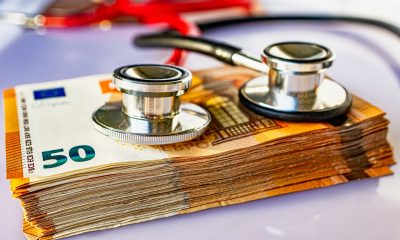Biotech
Biospain 2025: Barcelona Becomes Global Hub for Biotech Innovation and Sustainability
Biospain 2025, Spain’s top biotech event, returns to Barcelona October 7–9, uniting global innovation with local expertise. Key topics include AI in healthcare, green biotech, and EU regulations. The “Green Innovation Forum” debuts, while experts call for better SME support and public-private collaboration. Biospain aims to expand its global influence and foster biotech leadership.

The Spanish Association of Biocompanies (AseBio) and Biocat presented the latest developments at Biospain 2025, the largest national biotechnology event and one of the most important internationally, taking place in Barcelona on October 7, 8, and 9. Under the slogan “Global crossroads, local vibes,” Biospain reaffirms its mission to connect biotechnology with the world, while retaining the richness and talent of its local environment.
During the welcome ceremony, AseBio President Rocío Arroyo commented that the goal of this major event is to “accelerate the country’s transformative solutions in health, nutrition, and sustainability, developed locally and with an international reach. “Maintaining our roots, sharing what we do here with the rest of the world,” she said.
Arroyo emphasized that the focus of the Biospain program has been on the applications of healthcare technologies, “from the earliest stages to align ourselves with the reality of the healthcare system.” The impact of artificial intelligence on clinical research, biotechnology applied to regenerative agriculture, and the European regulatory context regarding new genomic techniques and pharmaceutical legislation will also be discussed.
This year, there will be a separate space for companies in the agricultural, food, and industrial biotechnology sectors: the “Green Innovation Forum,” “which will demonstrate how green biotechnology has the capacity to transform many of the country’s challenges as a key tool in the transition toward a more sustainable, carbon-neutral, and ecological economic model.”
Biospain 2025 includes 60 sessions that will address the latest advances in genomics, gene editing (Crispr), oncology therapies and immunotherapies, as well as synthetic biology
During the presentation, Ion Arocena, general director of AseBio, held a debate with Marina Pollán, director of the Carlos III Health Institute (ISC-III), Carles Fàbrega, director of Hipra Human Health, and Isabel Portero, CEO of Biohope, in which the topic was ‘The role of the biotechnology industry in the face of the strategic autonomy of the European Union ‘.
In this regard, Isabel Portero was very clear in her message: for her, biotechnology is vital. “Europe must believe in itself as a region, and we have the capacity to build the entire value chain, just as the Americans did in the 20th century. We can invent, develop, and advance the innovation created in Europe and make the return journey; that is, bring our innovation to the Americas and Asia, which, in my view, represents a change in mentality and paradigm,” she said.
On the other hand, Carles Fàbrega commented that, in the company’s 50 years of existence, they have carried out research and innovation in the field of animal health, and have developed innovative products 100% manufactured in Europe.
In the context of the COVID -19 emergency, they decided to take the plunge and begin developing products for human health. “We feel comfortable replicating this model. There are companies in Europe with similar capabilities, and if we create an ecosystem that fosters this, we will cease to be manufacturers and producers of third-party innovation and become more proactive,” stated the director of Hipra Human Health.
Regarding the transfer of science to innovation, Marina Pollán explained that they are not merely funding agencies, but are considered key figures as collaborative networks, always considering research as a spearhead, enabling improvements to the system.
“Researchers lack a certain level of understanding of the path they must take from the moment they see a need, have an idea, include it in a study, and then transfer it.” She also explained that the regulatory environment is very demanding, and there is also a lack of understanding of what it entails. “It’s a long road in which standards must be achieved, which isn’t always easy,” indicated the director of the ISC-III.
The second section of the debate addressed regulation and innovation in biotechnology. In this regard, small and medium-sized enterprises (SMEs) face greater barriers within the complexity of European relations. For this reason, Isabel Portero highlighted the significant problem of “protectionism,” in which the public administration treats a large multinational corporation the same as a local medium-sized business or an SME.
The CEO of Biohope commented that an important measure for a biotechnology SME to achieve the right approach is dialogue. “It would be extremely useful to have an interactive meeting with regulatory bodies. Not so they can act as consultants, but to be able to present proposals and have a debate that can help guide things.” In this regard, she explained that this type of consultation exists in part in the field of drug development, but not in the development of in vitro diagnostic products.
Regarding regulatory changes, Carles Fàbrega explained the ongoing debate about the agility and scientific rigor of products reaching the market. He cited the regulatory framework implemented during COVID-19 as an example: “Purchasing and financing mechanisms were established for vaccine development . In other words, solutions were found under the pressure of the pandemic. We shouldn’t expect another pandemic because many products could die along the way,” said the director of Hipra Human Health.
For her part, María Pollán discussed the government’s support measures for public-private collaboration, which guarantee companies’ access to innovation in the market.
In this regard, the director of the Carlos III Institute explained that there are two: on the one hand, support for research funding, which is essential to comply with regulatory standards. “The fundamental reason is that in Europe, the private investment sector is quite conservative and tends to start investing when the risk of technological failure is receding. Therefore, the previous path is financed with public support.”
The second option is innovative public procurement, a concept that establishes mechanisms to facilitate the entry of biomedical innovation into healthcare systems. “For me, this concept seems poorly articulated. I think it should be more focused, more deliberate, and developed, because it would be a lever that would allow for a much easier and less costly entry into innovation,” he stated.
In conclusion, Biocat’s CEO, Robert Fabregat, thanked Barcelona City Council and the Generalitat of Catalonia for their support of this twelfth edition of Biospain, held in Barcelona, one of Europe’s most important health hubs. “We have to overcome our complexes, because from here we are capable of tackling major challenges. We’re not just reactive and waiting for people to tell us how to do things. We have the capacity to step up and lead these major questions, which may now have no answers, but we have the capacity to generate debate. Biospain creates connections with a European vision, creates dialogues and collaborations, which emerge from these meetings.”
It should be noted that the ISC-III will attend Biospain 2025 accompanied by its innovative community, comprised of the CIBER Consortium , the CNIO Foundation , and the ITEMAS Platform. Through these entities, the Institute will present programs aimed at bringing technologies with potential for industrial development to the market, as well as strategies to improve the transfer of funded research projects, strengthening public-private collaboration within the framework of Horizon Europe.
The 2025 edition aims to surpass the records achieved in 2023, when Biosopain brought together more than 2,200 attendees from nearly 1,000 companies in 34 countries and generated more than 5,000 one-to-one meetings.
Among this year’s key new features is the “Green Innovation Forum,” a unique space that will allow for scheduling strategic meetings, presenting innovative projects, and addressing key debates on biotechnology and the green economy. Furthermore, following the success of previous editions, Barcelona has been confirmed as the venue for future Biospain events in 2027 and 2029, consolidating its position as one of the main European hubs for health and innovation.
__
(Featured image by Logan Armstrong via Unsplash)
DISCLAIMER: This article was written by a third party contributor and does not reflect the opinion of Born2Invest, its management, staff or its associates. Please review our disclaimer for more information.
This article may include forward-looking statements. These forward-looking statements generally are identified by the words “believe,” “project,” “estimate,” “become,” “plan,” “will,” and similar expressions. These forward-looking statements involve known and unknown risks as well as uncertainties, including those discussed in the following cautionary statements and elsewhere in this article and on this site. Although the Company may believe that its expectations are based on reasonable assumptions, the actual results that the Company may achieve may differ materially from any forward-looking statements, which reflect the opinions of the management of the Company only as of the date hereof. Additionally, please make sure to read these important disclosures.
First published in diariofarma. A third-party contributor translated and adapted the article from the original. In case of discrepancy, the original will prevail.
Although we made reasonable efforts to provide accurate translations, some parts may be incorrect. Born2Invest assumes no responsibility for errors, omissions or ambiguities in the translations provided on this website. Any person or entity relying on translated content does so at their own risk. Born2Invest is not responsible for losses caused by such reliance on the accuracy or reliability of translated information. If you wish to report an error or inaccuracy in the translation, we encourage you to contact us

-

 Crypto1 week ago
Crypto1 week agoBitcoin Rebounds Above $70K as Crypto Markets Show Fragile Signs of Recovery
-

 Crypto2 weeks ago
Crypto2 weeks agoCrypto Markets at a Crossroads as Bitcoin Slides to $75,000
-

 Biotech4 days ago
Biotech4 days agoEurope Launches Personalized Cancer Medicine Initiative
-

 Impact Investing2 weeks ago
Impact Investing2 weeks agoEnfinity Launches First Solar Plant in Italy with Microsoft

























